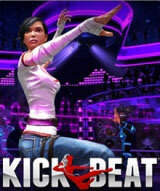- CLASSIC MAGAZINES
- REVIEW CREW
A show recapping what critics thought back
when classic games first came out! - NEXT GENERATION'S BEST & WORST
From the worst 1-star reviews to the best
5-stars can offer, this is Next Generation! - NINTENDO POWER (ARCHIVE)
Experience a variety of shows looking at the
often baffling history of Nintendo Power! - MAGAZINE RETROSPECTIVE
We're looking at the absolutely true history of
some of the most iconic game magazines ever! - SUPER PLAY'S TOP 600
The longest and most ambitious Super NES
countdown on the internet! - THEY SAID WHAT?
Debunking predictions and gossip found
in classic video game magazines! - NEXT GENERATION UNCOVERED
Cyril is back in this spin-off series, featuring the
cover critic review the art of Next Generation! - HARDCORE GAMER MAGAZING (PDF ISSUES)
Download all 36 issues of Hardcore Gamer
Magazine and relive the fun in PDF form!
- REVIEW CREW
- ELECTRONIC GAMING MONTHLY
- ELECTRONIC GAMING MONTHLY RANKS
From Mario to Sonic to Street Fighter, EGM
ranks classic game franchises and consoles! - ELECTRONIC GAMING MONTHLY BEST & WORST
Counting down EGM’s best and worst reviews
going year by year, from 1989 – 2009! - ELECTRONIC GAMING BEST & WORST AWARDS
11-part video series chronicling the ups and
downs of EGM’s Best & Worst Awards!
- ELECTRONIC GAMING MONTHLY RANKS
- GAME HISTORY
- GAME OVER: STORY BREAKDOWNS
Long-running series breaking down game
stories and analyzing their endings! - A BRIEF HISTORY OF GAMING w/ [NAME HERE]
Real history presented in a fun and pithy
format from a variety of game historians! - THE BLACK SHEEP
A series looking back at the black sheep
entries in popular game franchises! - INSTANT EXPERT
Everything you could possibly want to know
about a wide variety of gaming topics! - FREEZE FRAME
When something familiar happens in the games
industry, we're there to take a picture! - I'VE GOT YOUR NUMBER
Learn real video game history through a series
of number-themed episodes, starting at zero! - GREAT MOMENTS IN BAD ACTING
A joyous celebration of some of gaming's
absolute worst voice acting!
- GAME OVER: STORY BREAKDOWNS
- POPULAR SHOWS
- DG NEWS w/ LORNE RISELEY
Newsman Lorne Riseley hosts a regular
series looking at the hottest gaming news! - REVIEW REWIND
Cyril replays a game he reviewed 10+ years
ago to see if he got it right or wrong! - ON-RUNNING FEUDS
Defunct Games' longest-running show, with
editorials, observations and other fun oddities! - DEFUNCT GAMES QUIZ (ARCHIVE)
From online quizzes to game shows, we're
putting your video game knowledge to the test!- QUIZ: ONLINE PASS
Take a weekly quiz to see how well you know
the news and current gaming events! - QUIZ: KNOW THE GAME
One-on-one quiz show where contestants
find out if they actually know classic games! - QUIZ: THE LEADERBOARD
Can you guess the game based on the classic
review? Find out with The Leaderboard!
- QUIZ: ONLINE PASS
- DEFUNCT GAMES VS.
Cyril and the Defunct Games staff isn't afraid
to choose their favorite games and more! - CYRIL READS WORLDS OF POWER
Defunct Games recreates classic game
novelizations through the audio book format!
- DG NEWS w/ LORNE RISELEY
- COMEDY
- GAME EXPECTANCY
How long will your favorite hero live? We crunch
the numbers in this series about dying! - VIDEO GAME ADVICE
Famous game characters answer real personal
advice questions with a humorous slant! - FAKE GAMES: GUERILLA SCRAPBOOK
A long-running series about fake games and
the people who love them (covers included)! - WORST GAME EVER
A contest that attempts to create the worst
video game ever made, complete with covers! - LEVEL 1 STORIES
Literature based on the first stages of some
of your favorite classic video games! - THE COVER CRITIC
One of Defunct Games' earliest shows, Cover
Critic digs up some of the worst box art ever! - COMMERCIAL BREAK
Take a trip through some of the best and
worst video game advertisements of all time! - COMIC BOOK MODS
You've never seen comics like this before.
A curious mix of rewritten video game comics!
- GAME EXPECTANCY
- SERIES ARCHIVE
- NINTENDO SWITCH ONLINE ARCHIVE
A regularly-updated list of every Nintendo
Switch Online release, plus links to review! - PLAYSTATION PLUS CLASSIC ARCHIVE
A comprehensive list of every PlayStation
Plus classic release, including links! - RETRO-BIT PUBLISHING ARCHIVE
A regularly-updated list of every Retro-Bit
game released! - REVIEW MARATHONS w/ ADAM WALLACE
Join critic Adam Wallace as he takes us on a
classic review marathon with different themes!- DEFUNCT GAMES GOLF CLUB
Adam Wallace takes to the links to slice his way
through 72 classic golf game reviews! - 007 IN PIXELS
Adam Wallace takes on the world's greatest spy
as he reviews 15 weeks of James Bond games! - A SALUTE TO VAMPIRES
Adam Wallace is sinking his teeth into a series
covering Castlevania, BloodRayne and more! - CAPCOM'S CURSE
Adam Wallace is celebrating 13 days of Halloween
with a line-up of Capcom's scariest games! - THE FALL OF SUPERMAN
Adam Wallace is a man of steel for playing
some of the absolute worst Superman games! - THE 31 GAMES OF HALLOWEEN
Adam Wallace spends every day of October afraid
as he reviews some of the scariest games ever! - 12 WEEKS OF STAR TREK
Adam Wallace boldly goes where no critic has
gone before in this Star Trek marathon!
- DEFUNCT GAMES GOLF CLUB
- DAYS OF CHRISTMAS (ARCHIVE)
Annual holiday series with themed-episodes
that date all the way back to 2001!- 2015: 30 Ridiculous Retro Rumors
- 2014: 29 Magazines of Christmas
- 2013: 29 Questionable Power-Ups of Christmas
- 2012: 34 Theme Songs of Christmas
- 2011: 32 Game Endings of Christmas
- 2010: 31 Bonus Levels of Christmas
- 2009: 30 Genres of Christmas
- 2008: 29 Controls of Christmas
- 2007: 34 Cliches of Christmas
- 2006: 33 Consoles of Christmas
- 2005: 32 Articles of Christmas
- 2004: 31 Websites of Christmas
- 2003: 29 Issues of Christmas
- 2002: 28 Years of Christmas
- 2001: 33 Days of Christmas
- NINTENDO SWITCH ONLINE ARCHIVE
- REVIEW ARCHIVE
- FULL ARCHIVE
KickBeat
Zen Studios may be best known for their wildly popular Pinball FX series, but lately they've been branching out with a surprisingly diverse line-up of games that has nothing to do with flippers and ramps. Earlier this year, the Budapest-based company released CastleStorm, a fast-paced strategy game that combined Angry Birds and tower defense. Now they're placing their bets on another quirky mash-up, the unfortunately titled KickBeat.
Announced well over a year ago, KickBeat has finally made its way to the PS Vita and PlayStation 3. It takes elements from two of my favorite genres -- rhythm games and fighters -- and creates one of the most intriguing games of the year. Sadly, the game is marred by a truly awful soundtrack and a story mode that locks the best content away from eager fans.
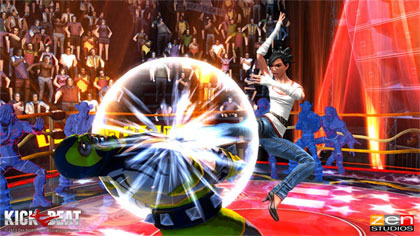
Don't worry; you won't be forced to use either of the PS Vita's two touchscreens like DJ Max Technika Tune. KickBeat uses the four face buttons, putting it more in line with Rock Band Unplugged on the PSP. You use the four face buttons to fight off an army of ninjas, wrestlers, clubbers and other assorted bad guys. As an enemy walks towards a marked direction, it's up to the player to hit the corresponding button. Hit the triangle for enemies at the top of the screen, square button for baddies attacking from the left and so on so forth.
As I'm sure you already know, none of this is as easy as it sounds. You'll quickly discover that there are many types of enemies, each with a different color scheme. For example, the yellow ninjas are slow, while their blue counterpart is quick. Red ninjas attack in teams, so the player will have to hit two or more buttons at once. Sometimes an enemy will require players to hold the button, waiting for their follower to show up.
None of these bad guys are particularly difficult when left to their own devices, especially when there's an on-screen button prompt and a predictable pattern to memorize. But things get tricky when all of these unfriendly faces strike one after another. Suddenly the screen becomes a chaotic mess and perfect timing becomes essential.
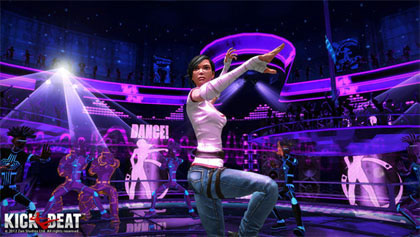
The game makes everything a little more complicated by tossing in power-ups. Certain enemies will have bonus points and power-ups floating above their head, requiring the player to double tap the button in order to collect the prize. But beware, it's easy to get used to double tapping a bunch of prize-holding enemies in a row, only to lose your multiplier by not noticing a regular one-hit baddie.
There are also a number of gameplay mechanics that immediately bring other rhythm games to mind. Under our hero's feet is a ying/yang symbol, which displays a life and multiplier bonus bar. Get hit too many times and the life bar will deplete, eventually leading to defeat. The other bar works similar to Rock Band's "Overdrive" (or Guitar Hero's "Star Power," if that's how you roll); once the player meets the requirement, they can unleash a power that doubles the current multiplier.
KickBeat has more than just hand-to-hand battles with large groups of fighters; it also has a number of boss fights. I was surprised that the various boss encounters weren't just harder enemies, but instead involved large bad guys that will test all of your KickBeating abilities. In one stage you leap from statue-to-statue shooting lasers and shocking the boss. Another stage has our hero fending off missile strikes from a helicopter. None of these battles deviate from the standard four-button set-up, but they feel substantially different from the typical stages.
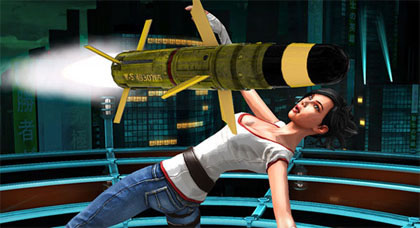
Best of all, these boss fights seem to be paired with KickBeat's best songs. I say that somewhat begrudgingly, as I don't genuinely love any of the 18 songs featured on the soundtrack. The closest I got was Marilyn Manson's "The Beautiful People" and Rob Zombie's infectious "Scum of the Earth." Even if you count those two 1990s singles twice, I would still be hard-pressed to come up with a list of five songs I liked.
The problem isn't the talent; there is a solid mix of fresh faces and top 40 hits. Big names or not, I found KickBeat's song selection to be endlessly frustrating. It is, for the most part, made up of the same nu-metal hit makers I normally try so desperately to avoid. Nearly every song has these components: Whispered lyrics, a yelled chorus and a section in the middle where somebody raps. And when it's not a who's who of nu-metal's finest, the game pees in the pool with dubstep.
I hate KickBeat's soundtrack in the same way Frosty the Snowman hates the hot, hot sun. There's so much yelling and growling that it made me yearn for a future when my bodiless head is stuffed in a very quiet jar. I feared every single death, because I knew it would mean playing my new least favorite song over again from the start.
Normally music games hope for the best by offering a large variety, from pop to rock to punk. Not KickBeat. This game puts all its musical eggs in one basket, and it ends up sinking the ship. No matter what I think of the gameplay, I will always think twice about playing KickBeat due entirely to the horrible song choices. Obviously, fans of nu-metal will likely disagree, perhaps even hailing this as one of the best rhythm games on the market. Those who don't see Fred Durst's genius need not apply.
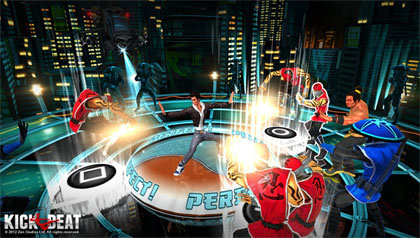
Thankfully there's respite from the non-stop nu-metal blowout. KickBeat allows players to import their own MP3s, creating customized levels with your own personal music tastes in mind. The import process is simple enough; though it's missing a way to sort by artist or album (it only displays song titles). Once imported, the game asks the player to account for the beats per minute and set other parameters. After that you're ready to rock 'n roll ... or whatever genre you import.
I tried several of my favorite bands, from mellow to hardcore. As expected, slower numbers by Emily Haines and Sigur Ros proved unsatisfying. On the other hand, early Garbage and The Propellerheads ended up working well, though not as seamless as the charts made specifically for the game. It's also worth noting that choosing a song longer than six minutes will require some unfortunate edits. Even though importing was a bit of a hassle, I had a good time trying various songs out and can see myself going back just to do that.

But here's the rub - the import mode has to be unlocked by playing through KickBeat's entire story mode. Many other modes are also locked from the start, such as free play. What's more, the harder difficulties are also locked, forcing players to go through each difficulty just to play at the "Master" level. While I encourage all beginners to start out with the normal setting, there's no reason why I shouldn't be able to bump up the difficulty at my own pace. No other music game does this.
There's a survival mode that sounds like a lot of fun, but I'll likely never see it because I will need to beat all 18 songs on four different difficulties just to have a chance to sample it. I can understand offering rewards for mastering the game, but holding back core modes is a step in the wrong direction.
I have somehow gone 1,200 words without mentioning the story, which involves Lee on a quest to take back the music that has been scattered around the world. The story plays out through a series of simple cinemas. While not bad, there are several cringe-inducing pop culture references that completely took me out of the experience. Needless to say, game writers should not name drop Justin Bieber.
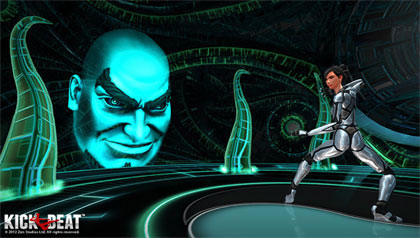
Despite my adverse reaction to the soundtrack, there's a lot I like about KickBeat. The gameplay is simple and addictive; I had a lot of fun beating up these poor, predictable fools. I also like how the online leaderboard is integrated into each menu page, giving players a sense on how they stack up against the world and their friends. The graphics are also sharp, though it took me awhile to warm to the character models.
With its song importer and fun gameplay, KickBeat proves to be an interesting idea. Unfortunately, the experience is nearly ruined thanks to a terrible soundtrack and core modes that are locked away for no good reason. If you can get past these problems, you'll discover a fun new take on the rhythm game genre. It's not perfect, but KickBeat is worth playing.
HOME |
CONTACT |
NOW HIRING |
WHAT IS DEFUNCT GAMES? |
NINTENDO SWITCH ONLINE |
RETRO-BIT PUBLISHING
Retro-Bit |
Switch Planet |
The Halcyon Show |
Same Name, Different Game |
Dragnix |
Press the Buttons
Game Zone Online | Hardcore Gamer | The Dreamcast Junkyard | Video Game Blogger
Dr Strife | Games For Lunch | Mondo Cool Cast | Boxed Pixels | Sega CD Universe | Gaming Trend
Game Zone Online | Hardcore Gamer | The Dreamcast Junkyard | Video Game Blogger
Dr Strife | Games For Lunch | Mondo Cool Cast | Boxed Pixels | Sega CD Universe | Gaming Trend
Copyright © 2001-2025 Defunct Games
All rights reserved. All trademarks are properties of their respective owners.
All rights reserved. All trademarks are properties of their respective owners.










